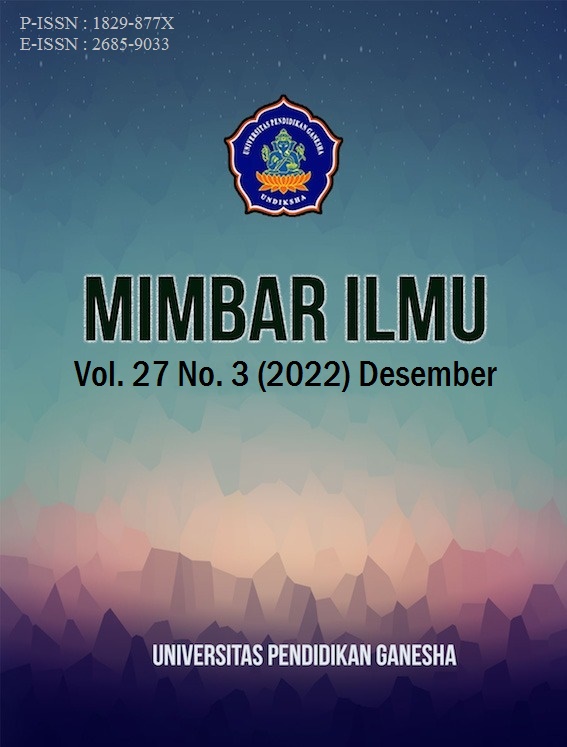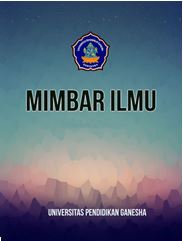Evaluation of the KONI Sports Coaching Program in Karangasem Bali Regency
DOI:
https://doi.org/10.23887/mi.v27i3.55351Keywords:
Program Evaluation, KONI Karangasem Sports Coaching, CIPP ModelAbstract
Sports coaching in the Province of Bali are unevenly distributed. It is proven that Karangasem Regency often ranks at the bottom. The fundamental cause experienced by KONI is that the sports coaching program that has yet to be implemented optimally refers to the progress of sports science and technology with scientific studies. The study aimed to evaluate the KONI sports coaching program in Karangasem Regency, Bali Province, using the context, input, process, and product (CIPP) model. Evaluation research uses a combination approach (quantitative and qualitative). The methods used in collecting data are observation, interviews, and documentation. The instrument used in collecting data is a questionnaire sheet. The data analysis used is data triangulation. The results of the study, namely First, recommend the results of the evaluation of the KONI sports coaching program in Karangasem Regency. Second, the KONI policy in Karangasem Regency in the development of sports coaching. Third, realizing sports coaching systems/coaching models at KONI Karangasem Regency. Fourth, make management of sports coaching at KONI Karangasem Regency. Related parties are expected to be able to make a real contribution in the management and development of KONI sports in Karangasem Regency, Bali Province.
References
Adellia, Y., & Prajawinanti, A. (2021). Implementasi Model Evaluasi CIPP Pada Pelaksanaan Program Kelompok Belajar TBM Leshutama Era Pandemi Covid-19. Pustaka Karya: Jurnal Ilmiah Ilmu Perpustakaan Dan Informasi, 9(2), 14–28. https://doi.org/http://dx.doi.org/10.18592/pk.v9i2.5516. DOI: https://doi.org/10.18592/pk.v9i2.5516
Aldapit, E., & Suharjana, S. (2019). CIPP evaluation model for the coaching program of running athletes. Psychology, Evaluation, and Technology in Educational Research, 1(2), 104. https://doi.org/10.33292/petier.v1i2.10. DOI: https://doi.org/10.33292/petier.v1i2.10
Amal, A. I., Sutapa, P., & Ramadhan, T. K. (2022). The relevance of physical conditions to team performance: A case study of PORPROV women’s volleyball athletes in Banyumas regency. Journal of Sports Science and Nutrition, 3(1), 95–102. https://doi.org/10.33545/27077012.2022.v3.i1b.83. DOI: https://doi.org/10.33545/27077012.2022.v3.i1b.83
Damrah, D., Pitnawati, P., & Erianti, E. (2019). Evaluation Program Guidance on Tennis Center in West Sumatera. International Journal of Sports Science, 9(4), 86–91. https://doi.org/10.5923/j.sports.20190904.02.
Fadli, Z. (2016). Hubungan Teknologi Informasi Dan Komunikasi Dalam Menunjang Kinerja Koni Provinsi Dan Induk-Induk Organisasi Cabang Olahraga Sumatera Utara. Jurnal Ilmu Keolahragaan, 15(1), 26–37. https://doi.org/10.24114/jik.v15i1.6119.
Hafsyah, Sukardi, & Ambiyar. (2019). Evaluation of the CIPP Model Information and Communication Technology Guidance Program. International Research Journal of Advanced Engineering and Science, 4(2), 386–390. https://doi.org/DOI: 10.5281/zenodo.3247548.
Hariyanto, A., Siantoro, G., Jayadi, I., & Fajar, M. K. (2022). Pelatihan Dasar Pelatih Puslatcab Tulungagung Guna Menghadapi Porprov 2022. Inspirasi: Jurnal Pengabdian Dan Pemberdayaan Masyarakat, 2(2), 71–76. https://journal.inspirasi.or.id/jppm/article/view/157.
Harsono. (1998). Coaching dan Aspek-aspek Psikologi dalam Coaching. P2LPTK Ditjen Dikti Depdikbud.
Hermens, N., Super, S., Verkooijen, K. T., & Koelen, M. A. (2017). A Systematic Review of Life Skill Development Through Sports Programs Serving Socially Vulnerable Youth. Research Quarterly for Exercise and Sport, 88(4), 408–424. https://doi.org/10.1080/02701367.2017.1355527. DOI: https://doi.org/10.1080/02701367.2017.1355527
Husdarta, J. S. (2010). Sejarah dan Filsafat Olahraga. Alfabeta.
Indrayana, B., & Sadikin, A. (2020). Penerapan E-Learning Di Era Revolusi Industri 4.0 Untuk Menekan Penyebaran Covid-19. Indonesian Journal of Sport Science and Coaching, 2(1), 46–55. https://doi.org/10.22437/ijssc.v2i1.9847. DOI: https://doi.org/10.22437/ijssc.v2i1.9847
Jiang, H., & Liu, Y. (2021). Construction of teaching quality evaluation system of higher vocational project-based curriculum based on cipp model. International Journal of Information and Education Technology, 11(6), 262–268. https://doi.org/10.18178/ijiet.2021.11.6.1521. DOI: https://doi.org/10.18178/ijiet.2021.11.6.1521
Jones, R. L., Harris, R., & Miles, A. (2009). Mentoring in sports coaching: A review of the literature. Physical Education and Sport Pedagogy, 14(3), 267–284. https://doi.org/10.1080/17408980801976569. DOI: https://doi.org/10.1080/17408980801976569
Juliandi, J., Hendrayana, Y., Ma’mun, A., & Masri, M. (2020). Evaluation of Sports Governance in Improving Achievement Sports. In 4th International Conference on Sport Science, Health, and Physical Education, 235–237. https://doi.org/10.2991/ahsr.k.200214.062. DOI: https://doi.org/10.2991/ahsr.k.200214.062
Komara, E. (2018). Penguatan Pendidikan Karakter dan Pembelajaran Abad 21. SIPATAHOENAN: South-East Asian Journal for Youth, Sports & Health Education, 4(1), 17–26. https://doi.org/https://doi.org/10.2121/sip.v4i1.991.
Kurniawan, A. W. (2021). Pengembangan Multimedia Interaktif Sport Massase Untuk Mahasiswa Pendidikan Jasmani Dan Kesehatan FIK-UM. Journal Coaching Education Sports, 2(1), 1 – 16. https://doi.org/10.31599/jces.v2i1.476. DOI: https://doi.org/10.31599/jces.v2i1.476
Kurniawati, E. W. (2021). Evaluasi Program Pendidikan Perspektif Model CIPP (Context, Input, Process, Product). Jurnal GHAITSA Islamic Education Jurnal, Volume 2(1), 24. https://doi.org/19-25. Retrieved from https://siducat.org/index.php/ghaitsa/article/view/168.
Lenthe, F. J., Van, Tak, N. I., Crawford, D., Brug, J., & Oenema, A. (2010). Availability of sports facilities as moderator of the intention – sports participation relationship among adolescents. Health Education Research, 25(3), 489–497. https://doi.org/10.1093/her/cyq024. DOI: https://doi.org/10.1093/her/cyq024
Lismadiana, ., Nugroho, A., & Lumintarso, R. (2020). Evaluation of National Training Management (Puslatda) Special Region of Yogyakarta. 724–729. https://doi.org/10.5220/0009802107240729. DOI: https://doi.org/10.5220/0009802107240729
Marwan, I., Rahmat, A. A., & Rohyana, A. (2018). Pelatihan Pengelolaan Manajemen Event Pertandingan Olahraga Untuk Pengurus Dan Anggota Koni Kota Tasikmalaya. Jurnal Pengabdian Siliwangi, 4(2). http://jurnal.unsil.ac.id/index.php/jps/article/view/674.
Maulana, D. A., Sugianto, & Riyadi, S. (2021). Traditional Games as Tourism Sports and Characteristics of Sports Culture in Sumbawa Indonesia. International Journal of Social Sciences and Humanities Invention, 8(10). https://doi.org/https://doi.org/10.18535/ijsshi/v8i10.05. DOI: https://doi.org/10.18535/ijsshi/v8i10.05
Nainggolan, A. P., & Manalu, R. B. B. (2021). Pengaruh Penggunaan Google Classroom Terhadap Efektifitas Pembelajaran. Journal Coaching Education Sports, 2(1), 17–30. https://doi.org/10.31599/jces.v2i1.515. DOI: https://doi.org/10.31599/jces.v2i1.515
Prasetyo, A., Rahayu, T., & RC, A. R. (2018). The Development of Sports Information Management System (SMICO) of KONI Salatiga Municipal. ,. Journal of Physical Education and Sports, 7(1), 88–94. https://doi.org/10.15294/JPES.V7I1.23513.
Pratiwi, M., Ridwan, & Waskito. (2019). Evaluasi Teaching Factory Model Cipp. Jurnal Imiah Pendidikan Dan Pembelajaran, 3(1), 414–421. https://doi.org/https://doi.org/10.23887/jipp.v3i3.22205.
Prayogo, D. (2022). CIPP Evaluation Model and Its Effect on E-Learning. AL-ISHLAH: Jurnal Pendidikan, 14(1), 177–188. https://doi.org/10.35445/alishlah.v14i1.1071. DOI: https://doi.org/10.35445/alishlah.v14i1.1071
Reo, P., Dhedhy, Y., & Rizky, M. Y. (2019). Analisis kondisi fisik atlet puslatkot Kota Kediri dalam rangka menuju “Kediri Emas” di Porprov 2019. Jurnal Sportif: Jurnal Penelitian Pembelajaran, 5(2), 342–353. http://repository.unpkediri.ac.id/id/eprint/2478. DOI: https://doi.org/10.29407/js_unpgri.v5i2.13758
Rizkian, F., & Nurrachmad, L. (2022). Organizational Management Of The Indonesian National Sports Committee (Koni) Kebumen Regency. Journal Of Physical Education Health And Sport Sciences, 3(1), 19–31. http://ejurnal.undana.ac.id/index.php/JPEHSS/article/view/8086.
Rustiadi, T. (2016). Study of Social Capital of KONI Community in the Sports Development in Central Java Indonesia. Journal of Sports Science, 4, 111–118. https://pdfs.semanticscholar.org/0940/f0e4883052b1b2c18ce4b95b19cc857017db.pdf.
Sembiring, S. U., Soegiyanto, S., & Yudha, D. W. (2020). Management of Sports Development Achievement of the Indonesian National Sports Committee Karo Regency, North Sumatra Province. Journal of Physical Education and Sports, 9(3), 282–288. https://journal.unnes.ac.id/sju/index.php/jpes/article/view/44108.
Setiawan, A., Yudiana, Y., Ugelta, S., Oktriani, S., Budi, D. R., & Listiandi, A. D. (2020). Hasil Belajar Pendidikan Jasmani dan Olahraga Siswa Sekolah Dasar: Pengaruh Keterampilan Motorik (Tinggi) dan Model Pembelajaran (Kooperatif). TEGAR: Journal of Teaching Physical Education in Elementary School, 3(2), 59–65. https://doi.org/10.17509/tegar.v3i2.24513. DOI: https://doi.org/10.17509/tegar.v3i2.24513
Sofyan, D. (2022). The Development of Sports Management Research in Indonesia in the Early Twenty-First Century: A Bibliometric Analysis. Indonesian Journal Of Sport Management, 2(1), 28–37. https://doi.org/10.31949/ijsm.v2i1.2248. DOI: https://doi.org/10.31949/ijsm.v2i1.2248
Sugiyono, H. (2016). Metode kualitatif dan kuantitatif. Cetakan Ke-23. Alfabeta, Bandung.
Tokmak, H. S., Baturay, H. M., & Fadde, P. (2013). Applying the context, input, process, product evaluation model for evaluation, research, and redesign of an online master’s program. International Review of Research in Open and Distance Learning, 14(3), 273–293. https://doi.org/10.19173/irrodl.v14i3.1485. DOI: https://doi.org/10.19173/irrodl.v14i3.1485
Trudel, P., Milestetd, M., & Culver, D. M. (2020). What the empirical studies on sport coach education programs in higher education have to reveal: A review. International Sport Coaching Journal, 7(1), 61–73. https://doi.org/10.1123/iscj.2019-0037. DOI: https://doi.org/10.1123/iscj.2019-0037
Vastyanov, R., Yermuraki, P., Stoyanov, A., Tiron, O., Beseda, Y., Ostapenko, I., Dobrovolsky, V., Lapshin, D., & Stecenko, A. (2021). New aspects of pedagogical activity in the distant form of pathological physiology teaching to medical university students. Journal of Education, Health and Sport, 11(10), 173–186. https://doi.org/10.12775/jehs.2021.11.10.015. DOI: https://doi.org/10.12775/JEHS.2021.11.10.015
Walker, L. F., Thomas, R., & Driska, A. P. (2018). Informal and nonformal learning for sport coaches: A systematic review. International Journal of Sports Science & Coaching, 13(5), 694–707. https://doi.org/10.1177/1747954118791522. DOI: https://doi.org/10.1177/1747954118791522
Warju. (2016). Educational Program Evaluation using CIPP Model. Innovation of Vocational Technology Education, 12(1), 36–42. https://doi.org/10.17509/invotec.v12i1.4502. DOI: https://doi.org/10.17509/invotec.v12i1.4502
Downloads
Published
How to Cite
Issue
Section
License
Copyright (c) 2022 I Putu Darmayasa, Suratmin, Made Juliani, I Putu Panca Adi, Ratna Kumala Setyaningrum, Hanik Liskustyawati

This work is licensed under a Creative Commons Attribution-ShareAlike 4.0 International License.
This work is licensed under a Creative Commons Attribution-ShareAlike 4.0 International License.
Authors who publish with this journal agree to the following terms:
- Authors retain copyright and grant the journal right of first publication with the work simultaneously licensed under a Creative Commons Attribution License that allows others to share the work with an acknowledgment of the work's authorship and initial publication in this journal.
- Authors are able to enter into separate, additional contractual arrangements for the non-exclusive distribution of the journal's published version of the work (e.g., post it to an institutional repository or publish it in a book), with an acknowledgment of its initial publication in this journal.
- Authors are permitted and encouraged to post their work online (e.g., in institutional repositories or on their website) prior to and during the submission process, as it can lead to productive exchanges, as well as earlier and greater citation of published work.








